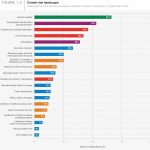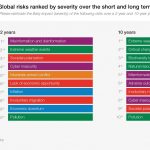ED’s Corner: Welcome to 2024!
 Welcome back to the WaterPortal! We hope you had a wonderful break with family and friends and are looking forward to 2024.
Welcome back to the WaterPortal! We hope you had a wonderful break with family and friends and are looking forward to 2024.
Looking back
To start 2024 off, it might be worth having a quick look back at 2023. The global re-insurer, Munich Re, has released their 2023 retrospective summary Record thunderstorm losses and deadly earthquakes: the natural disasters of 2023 [1]. Apart from the appalling loss of life last year, some 74,000 dead, the headline number of $250 billion losses globally is striking [2]. As someone with a background in the intersection of water management and disaster/emergency management, I rather grimly noted the storm losses. While a portion of the total losses below was insured, the significant majority was not insured with consequent implications for the individuals and societies affected by the storms.
- April’s USA Midwest thunderstorms – $6 billion
- May’s European flooding – $10 billion
- June’s USA thunderstorms and tornado series – $5.6 billion
- July’s Asia Typhoon Doksuri – $25 billion
- October’s Mexico Hurricane Otis which, in model-straining behaviour, over 24 hours worsened from a “Tropical Storm” to a “Category 5” hurricane – ~$12 billion
| Climate scientists have for years been warning that the greater energy in the atmosphere will lead to more frequent and more intense storms (see, for a recent example, the Government of Canada’s 2023 Synthesis Report [3]). While one storm does not climate change make (to shamelessly butcher a saying), the global trend is indicative (e.g. Figure 1 in the UK [4], USA [5]).
Supporting this, Swiss Re, another major global reinsurer, notes in a recent press release [6] that thunderstorm losses in 2023 tested the primary insurance industry which will have inevitable consequences for our insurance premiums. Swiss Re further notes that severe thunderstorm losses have been increasing an average 7% per year for the last 30 years and that 2023 represented a 90% increase over the previous 5-year average. Of course, using a financial measure to rank events tends to exclude the catastrophic events happening in less-developed parts of the world. Mexico’s Hurricane Otis was unprecedented in how quickly it worsened. However, East Africa’s Cyclone Freddy was unprecedented in duration [7] and storm energy [8]: it hit Mozambique twice, killed some 1400 people and damaged already-limited health care systems [9], and other infrastructure across the region. So, all in all, 2023 was not a good year for storms. |
 Figure 1: Increasing depth of 1:20, 1:50 and 1:100 floods in the United Kingdom [4] |
Looking forward
 Figure 2 : Top risks for 2024 [10] |
Looking forward, the 19th annual Global Risks Report [10] (GRR24) from the World Economic Forum, listing the top 20 global risks for 2024 (Figure 2), has just been released. Worryingly, especially in the context of 2023, two thirds of those surveyed as part of developing GRR24 identified extreme weather as “the top risk most likely to present a material crisis on a global scale in 2024”, second-most severe risk over the next two years and the top risk over the next decade (Figure 3) [11]. This concern was shared across all types of respondents. In a nutshell, people are worried. Unsurprisingly. |  Figure 3: Global risks for 2024-2025 and 2024-2033. [11] |
Any good news out there?
On the more positive side: some 61% of GRR24 respondents thought that “National and local regulations” have potential for addressing the “Biodiversity loss and ecosystem collapse” risk. With respect to addressing “Critical change to Earth systems”, 65% thought that “Global treaties and agreements” had strong potential.
More tangibly, a Swiss Re analysis of the damage from Hurricane Ian [12] (Florida, USA, 2022, ~$65 billion) estimated that current building standards in Florida mitigated the structural damage loss potential by 90-100% compared to the standards of the 1970s.
What to do?
My intention in writing this was two-fold: 1) to welcome you to the new year, and 2) share the release of the Global Risks Report and the Munch Re 2023 summary. It was not to depress you. Promise!
Clearly, we are in a challenging situation. A changing, more dangerous, climate is intersecting with a growing global population and a growing collection of assets-at-risk. “Business as usual”, based on practices and beliefs of the last, say, 50 years is becoming increasingly untenable.
I believe we need a greater focus on disaster risk reduction at all levels: individual, community, national and international. While few of us may be able to exert much influence on national or international action, I do believe we can take all action at the individual level and many at the community level.
So, for 2024, I urge you to look at your own risk profile. Did you know, for example, that research in 2020 found that 94% of Canadians living in designated flood risk areas did not know that fact [13]? Given the growing risk of thunderstorms, are you in an area where hail is a threat [14] (Click here for an Institute of Catastrophic Loss Reduction map of hail days across Canada)? While we are the WaterPortal and, by mandate, focused on water-related topics, please look beyond your risk of flooding and storm damage. And don’t assume that insurance will cover your possible losses [15].
If this is completely new to you, start with taking a suspicious and pessimistic look at your daily life – what can go wrong? If it does, what will you do? What can you do to reduce the chance of a problem in the first place? What programs does your community have with respect to reducing your and the community’s risk?
Chat to your local disaster management folk – they will probably be delighted in your interest! And, they may well have local information for you and suggestions as to what you can do. And, of course, there is a lot of material on the internet (e.g. FloodSmart Canada, FireSmart Canada, HailSmart, earthquake hazard).
Good luck in 2024 – we wish you and your families a safe and happy year with just the right amount of water!
PS – we have exciting changes coming – keep an eye on the WaterPortal in the coming months!
Sources:
[1] https://www.munichre.com/en/company/media-relations/media-information-and-corporate-news/media-information/2024/natural-disaster-figures-2023.html. Accessed 2024-01-10.
[2] Munich Re Fact sheet: https://www.munichre.com/content/dam/munichre/mrwebsitespressreleases/MunichRe-NatCAT-Stats2023-Full-Year-Factsheet.pdf/_jcr_content/renditions/original./MunichRe-NatCAT-Stats2023-Full-Year-Factsheet.pdf. Accessed 2024-01-10.
[3] Lulham, N., Warren, F.J., Walsh, K.A. and Szwarc, J. (2023). Canada in a Changing Climate: Synthesis Report; Government of Canada, Ottawa, Ontario. http://www.changingclimate.ca/synthesis. Accessed 2024-01-10.
[4] Slater, L. & Hannaford, J., 2024, Extreme UK flood levels are happening much more often than they used to, analysis shows. https://theconversation.com/extreme-uk-flood-levels-are-happening-much-more-often-than-they-used-to-analysis-shows-220788. Accessed 2024-01-11.
[5] National Centers for Environmental Information, National Oceanic and Atmospheric Administration, 2024, Billion-Dollar Weather and Climate Disasters. https://www.ncei.noaa.gov/access/billions/time-series/US/cost. Accessed 2024-01-11.
[6] Swiss Re, 2023, Insured losses from severe thunderstorms reach new all-time high of USD 60 billion in 2023, Swiss Re Institute estimates. https://www.swissre.com/press-release/Insured-losses-from-severe-thunderstorms-reach-new-all-time-high-of-USD-60-billion-in-2023-Swiss-Re-Institute-estimates/4a15acf7-64b4-4766-8662-1c35d268ab12. Accessed 2024-01-10.
[7] BBC News, 2023, Freddy: The deadly cyclone that lasted more than a month. https://www.bbc.com/news/world-africa-64978492. Accessed 2024-01-10.
[8] Menga, M., 2023, Climate intelligence at work: the case of Cyclone Freddy. https://www.climateforesight.eu/articles/the-perfect-storm-the-extreme-power-of-cyclone-freddy/. Accessed 2024-01-10.
[9] UN News, 2023, Southern Africa: Cyclone Freddy aftermath brings diseases, healthcare gaps. https://news.un.org/en/story/2023/03/1134962. Accessed 2024-01-10.
[10] World Economic Forum, 2024, Global Risks Report 2024. https://www.weforum.org/publications/global-risks-report-2024/. Accessed 2024-01-10.
[11] Ibid. Page 7.
[12] Karaca, E., 2023, Ian revisited: Disentangling the drivers of US hurricane losses. https://www.swissre.com/risk-knowledge/mitigating-climate-risk/hurricane-ian-revisited.html. Accessed 2024-01-10.
[13] Partners for Action, 2020, Canadian Voices on Flood Risk 2020. https://uwaterloo.ca/partners-for-action/past-projects/canadian-voices-flood-risk-2020. Accessed 2024-01-10.
[14] Institute for Catastrophic Loss Reduction, https://www.iclr.org/hail-2/. Accessed 2024-01-10.
[15] CBC, 2024, As weather-related disasters mount, some Canadian homeowners can’t get insurance coverage. https://www.cbc.ca/news/climate/insurance-extreme-weather-1.7078544. Accessed 2024-01-10.
